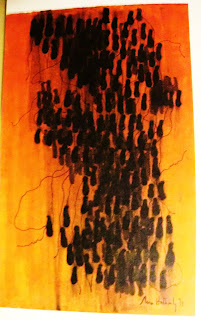On the way to lower Broadway
this morning I faced a tall man
speaking to a piece of chalk
held in his right hand. The left
was open, and it kept the beat,
for his speech had a rhythm,
was a chant or dance, perhaps
even a poem in French, for he
was from Senegal and spoke French
so slowly and precisely that I
could understand as though
hurled back fifty years to my
high school classroom. A slender man,
elegant in his manner, neatly dressed
in the remnants of two blue suits,
his tie fixed squarely, his white shirt
spotless though unironed. He knew
the whole history of chalk, not only
of this particular piece, but also
the chalk with which I wrote
my name the day they welcomed
me back to school after the death
of my father. He knew feldspar.
he knew calcium, oyster shells, he
knew what creatures had given
their spines to become the dust time
pressed into these perfect cones,
he knew the sadness of classrooms
in December when the light fails
early and the words on the blackboard
abandon their grammar and sense
and then even their shapes so that
each letter points in every direction
at once and means nothing at all.
At first I thought his short beard
was frosted with chalk; as we stood
face to face, no more than a foot
apart, I saw the hairs were white,
for though youthful in his gestures
he was, like me, an aging man, though
far nobler in appearance with his high
carved cheekbones, his broad shoulders,
and clear dark eyes. He had the bearing
of a king of lower Broadway, someone
out of the mind of Shakespeare or
Garcia Lorca, someone for whom loss
had sweetened into charity. We stood
for that one long minute, the two
of us sharing the final poem of chalk
while the great city raged around
us, and then the poem ended, as all
poems do, and his left hand dropped
to his side abruptly and he handed
me the piece of chalk. I bowed,
knowing how large a gift this was
and wrote my thanks on the air
where it might be heard forever
below the sea shell’s stiffening cry.
Philip Levine, EUA (1928-2015)






















